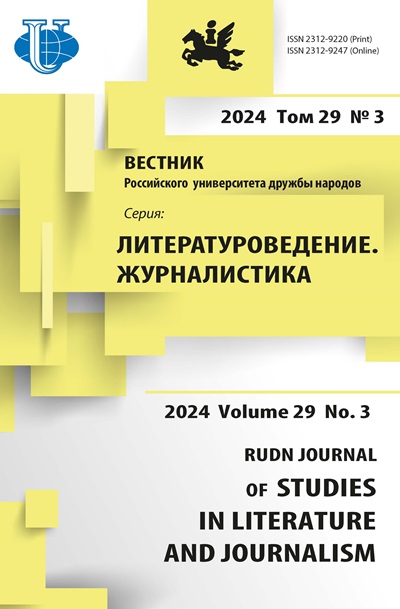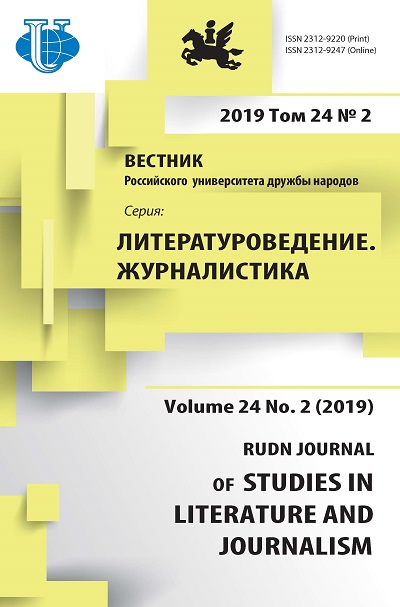Rubric “Stories” of information portal “Meduza”: traditions and innovations
- Authors: Nalitova N.U.1, Petrushina M.V.1
-
Affiliations:
- Moscow Polytechnic University
- Issue: Vol 24, No 2 (2019)
- Pages: 295-302
- Section: JOURNALISM
- URL: https://journals.rudn.ru/literary-criticism/article/view/21738
- DOI: https://doi.org/10.22363/2312-9220-2019-24-2-295-302
Cite item
Full Text
Abstract
The article examines the “Stories” section of the “Meduza” Internet portal as a vivid example of the processes taking place in new media - the convergence of classical genres, the use of new technical and communication tools. The purpose of the study is to identify the content and genre features that represent the specific properties and characteristics of the materials of the heading “Stories” as an innovative genre of online media. Not only publications published in the “Stories” section were studied, but also Internet resources that covered the creation and functioning of the online publication. As a result of the study, it was found that the materials of the “Stories” heading have both common to most online publications and specific features, which gives grounds to define the “Stories” heading as a special genre of online media. The results of the linguistic study of the “Stories” section are of great importance in studying the peculiarities of the network infosphere and the practice of creating Internet content. Research materials can be used directly in the work of journalists of online publications, as well as in the development of training courses for students of the journalism training area.
Keywords
About the authors
Natalia U. Nalitova
Moscow Polytechnic University
Author for correspondence.
Email: Nalitova_natalia@mail.ru
BA, the master student, The Department of Journalism and Mass Communications, Higher School of Printing and Media Industry, Moscow Polytechnic University
38 Bolshaya Semenovskaya St., Moscow, 107023, Russian FederationMaria V. Petrushina
Moscow Polytechnic University
Email: mpetrushina@mail.ru
Ph.D of Philological Sciences, Docent, Associate Professor at The Department of Russian Language and History of Literature, Higher School of Printing and Media Industry, Moscow Polytechnic University
38 Bolshaya Semenovskaya St., Moscow, 107023, Russian FederationReferences
- Birjukov V.A., Livson M.V. Auditorija sredstv massovoj informacii kak kljuchevoj faktor strategii razvitija mediabiznesa v jekonomike vnimanija [The audience of the media as a key factor in the development strategy of the media business in the economy of attention]. Izvestija vysshih uchebnyh zavedenij. Problemy poligrafii i izdatel’skogo dela [Proceedings of higher educational institutions. Problems of printing and publishing]. 2015. No. 1. Pp. 103—109.
- Varakin V.S. Storitelling kak instrument informatsionnogo modelirovaniya sotsial’noi deistvitel’nosti [Storytelling as a fool of information modelling of social reality]. Socialnaja missija zhurnalistiki: realii i prognozy: materialy mezhvuzovskoj nauchno-prakticheskoj konferencii [Social mission of journalism: realities and forecasts: materials of the interuniversity scientific-practical conference]. Arhangelsk, 2014. Pp. 92—99.
- Kosickaja F.L. Rechevoj zhanr kak edinica kontrastivnogo analiza [Speech genre as a unit of contrastive analysis]. Vestnik TGPU [Bulletin of TSPU]. 2006. No. 4. Pp. 101—105.
- Lukina M.M. Internet-SMI: teorija i praktika [Internet media: theory and practice]. Moscow: Aspekt Press Publ., 2010. 348 p.
- Mitasheva M.S., Varakin V.S. Storitelling kak tehnologicheskaja osnova zhurnalistiki (opyt teoreticheskoj argumentacii) [Storytelling as the technological basis of journalism (the experience of theoretical argumentation)]. Concept. 2017. No. 2. Pp. 637—641.
- Samarcev O.R. Tvorcheskaja dejatel’nost’ zhurnalista: ocherki teorii i praktiki [Reative activity of a journalist: essays of theory and practice]. Moscow: Akademicheskij proekt Publ., 2010. 526 p.
- Sinclair J.B. A story about a message that was a story: message form and its implications to knowledge flow. Helsinki: Hanken School of Economics, Department of Management and Organization; Edita Prima. 2010, 142 p.
















